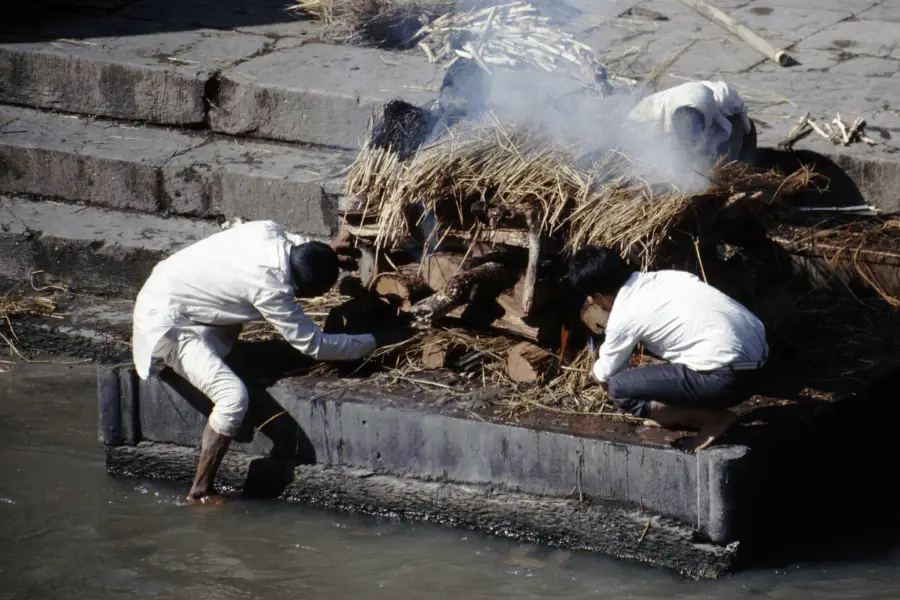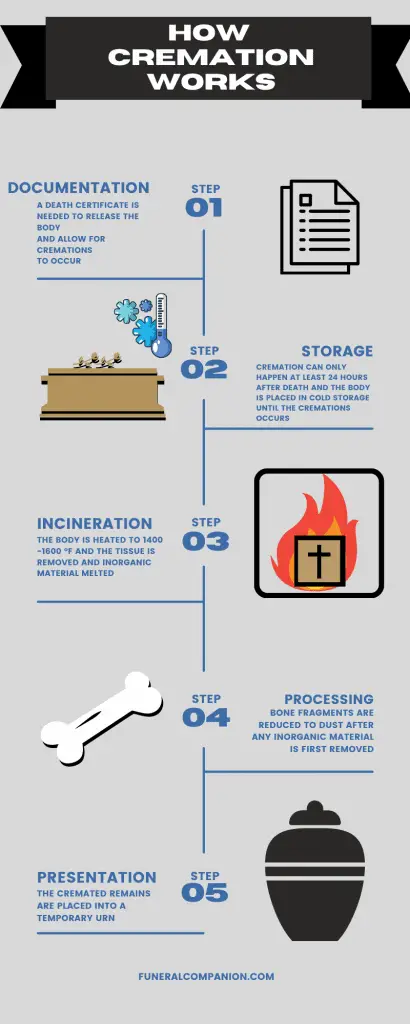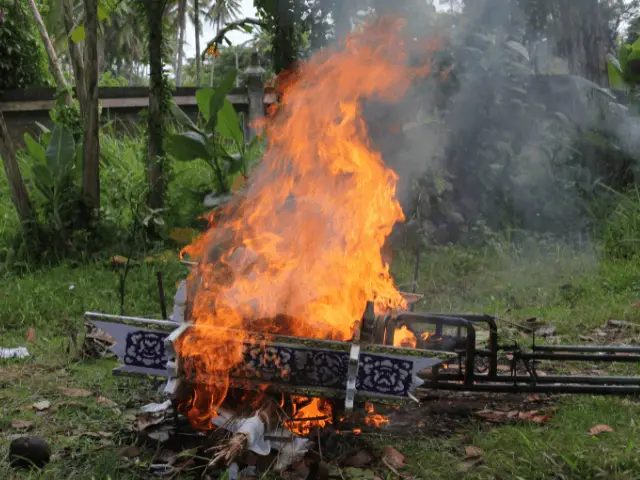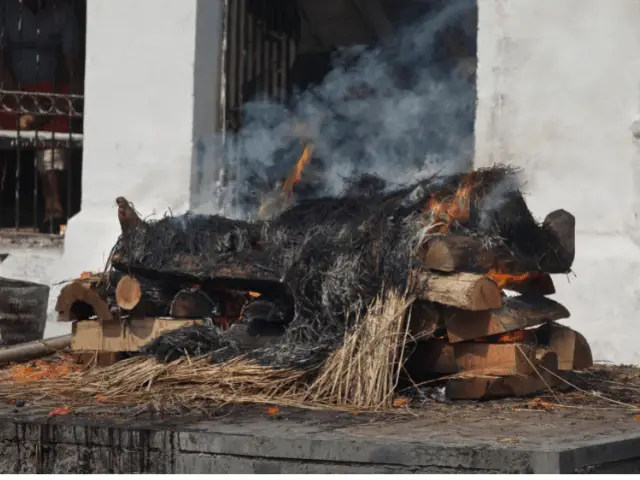Cremation is becoming more and more popular in the states, as demand rises no doubt so will the price. This may lead some people to ask the question about whether or not they can perform a cremation themselves on private property, just like people have done for thousands of years.
In the US only licensed operators can carry out cremations in an approved facility that is capable of the task. Getting the license in most states requires training from the CANA or NFDA. Crematoriums are also legally required to be capable of properly storing bodies. DIY cremation are illegal.
In all most all cases, even if you have a license to conduct cremations you won’t have the required facility to cremate a body in your backyard.
If you are interested in finding out more, then I invite you to continue reading the rest of this article.

What it takes to cremate a body successfully
The most traditional way of cremation is to use fire, but water cremation is becoming ever popular in the states as an alternative.
In order to reduce a human body to ashes, a crematorium has a special cremator with two chambers, one above the other. They also have to adhere to strict cold storage regulations of the bodies waiting to be cremated.
During the actual cremation process, the body undergoes heat of between 1400 and 1600 degrees Fahrenheit (depending on state regulations) and the main tissue is incinerated.

After this, the bones are left in the main chamber while all other inorganic material, from surgical implants, for example, are collected in the second chamber. The bones are then carefully removed to be cooled before being placed in a processor which pulverizes them into dust. This is what makes up the cremated remains.
Although a bonfire can reach temperatures in excess of 2,000 °F, most people would not have the required facilities to break down the bone fragments to produce the ashes needed for scattering.
Is a home cremation a felony?
The inappropriate or failure to properly dispose of human remains is a felony in all US states with varying punishments including imprisonment or a hefty fine or both. In addition to proper disposal, you need to provide the correct documents to carry out a cremation or burial.
As it is very unlikely that you would be following the correct laws by cremating a body at home, you could risk ending up behind bars and having a very severe fine to pay.
All states are slightly different and some states have very weak or poorly-written laws about this. Michigan is one state which changed it’s laws due to a huge scandal involving a failure to properly cremate over 300 bodies by one licensed operator.
The law in Michigan now states that if a person fails to properly dispose of human remains in ‘more than 180 days after the date the person took possession of the body, he or she would be guilty of a felony punishable by imprisonment for not more than 10 years, a fine of not more than $50,000, or both’.
You should double-check with your state, but you will no doubt find similar if not harsher punishments
Are open funeral pyres illegal in the USA?

It is illegal to have an open air funeral pyre in the USA on private property regardless of religion or culture. Only one licensed operator, located in Colorado, currently has the right to conduct open air cremations with a second group in Arkansas looking to begin in the near future.
The Crestone End Of Life Project (CEOLP) is the only operator legally allowed to conduct open-air cremations in the USA. Their services are only available to Saguache County residents and landowners, so this isn’t an option for everyone.
So if you were planning for a Viking funeral, whether a historically accurate one or a burning longship or hoping for a Greco-Roman funeral pyre, you need to move to the right place in Colorado.
Who has the right to organize a cremation in the US?
Most US states give the right to organize a cremation to the spouse or offspring of the deceased assuming they have a majority. When no immediate or named next of kin can be found, the state takes over the responsibility of disposing of with human remains.
However, just because you have the legal right to organize a funeral doesn’t mean you can dispose of the remains in any way you see fit. You must have the required documentation, including a death certificate, and wait the required amount of time, normally at least 24 hours after death.
Can you be cremated without a coffin?

Being cremated without a coffin is legal in the USA but often you need to be incinerated in at least a cardboard casket. Laws change from state to state, but there is no law saying you much be cremated in a wooden casket or any other such container.
As most cremation services don’t actually end with the immediate incineration of a body it is possible to rent a casket and then have the remains transferred into the cremator.
This is a more environmentally-friendly option as it calls for less wood to be used to make caskets and also is cheaper for the consumer. The funeral director can also make money from this rental service, meaning everyone is happy.
Legal alternatives to cremation at home
Although you cannot cremate a body on your own property without breaking the law, there are other options for a home burial which don’t involve the expenses of a funeral home.
In most states, families are allowed to bury their loved ones on their own land, particularly in rural areas. They still need to file for the correct documentation to report a death and transport the body if needed. If you would like to read more about burying a loved one on your property, feel free to read my full article here.
Can you cremate a pet at home?
There aren’t any specific laws prohibiting the cremation of pets at home, however, in many cases doing so may be in breach of the Clean Air Act. If you live in a fairly rural area you will probably be able to cremate a medium size pet without any issues. This will take a lot longer than a smaller pet such as a hamster or reptile.
This is probably not the case in a city environment. Alternative methods include opting for a ‘water cremation’ which dissolves your pet’s remains without the need for fire.
Pet burial is a less harmful way to dispose of pets on your own property as there will less pollution into the atmosphere.
If you want to cremate your pet but don’t have the space on your property, you can have it done by a professional and then use the ashes to grow a permanent reminder of your furry friend using one of these specially designed urns.
KIRI Bio Urn for Human and Pet Cremation

Buy this on Amazon by clicking the link
Bios Memorial Pet Loss Urn

Buy this on Amazon by clicking the link
Another great option is to get the ashes made into a permanent piece of jewelry, you should check out the beautiful handcrafted pieces Mark Hamilton makes with cremains by visiting his site here.
Nevertheless, if you are determined to cremate your pet at home, make sure that you go about it in the right way by reading this article.
If you want to pick up a quality urn or memorial for your beloved pet I would also really recommend OneWorld Memorial which offers a wide range of products for both pet and human memorials. I was personally very happy with an urn I bought from them recently.
US law on cremation
For more details about the exact letter of the law in your state, you can contact your local officials (See this handy resource here) or follow the link to the appropriate statutes in the links below.
| State | Statues & regulations |
|---|---|
| Alabama | link |
| Alaska | link |
| Arizona | link |
| Arkansas | link |
| California | link |
| Colorado | link |
| Connecticut | link |
| Delaware | link |
| Florida | link |
| Georgia | link |
| Hawaii | link |
| Florida | link |
| Illinois | link |
| Indiana | link |
| Iowa | link |
| Kansas | link |
| Kentucky | link |
| Louisiana | link |
| Maine | link |
| Maryland | link |
| Massachusetts | link |
| Michigan | link |
| Minnesota | link |
| Mississippi | link |
| Missouri | link |
| Montana | link |
| Nebraska | link |
| Nevada | link |
| New Hampshire | link |
| New Jersey | link |
| New Mexico | link |
| New York | link |
| North Carolina | link |
| North Dakota | link |
| Ohio | link |
| Oklahoma | link |
| Oregon | link |
| Pennsylvania | link |
| Rhode Island | link |
| South Carolina | link |
| South Dakota | link |
| Tennessee | link |
| Texas | link |
| Utah | link |
| Vermont | link |
| Virginia | link |
| Washington | link |
| West Virginia | link |
| Wisconsin | link |
| Wyoming | link |
| Washington D.C | link |




